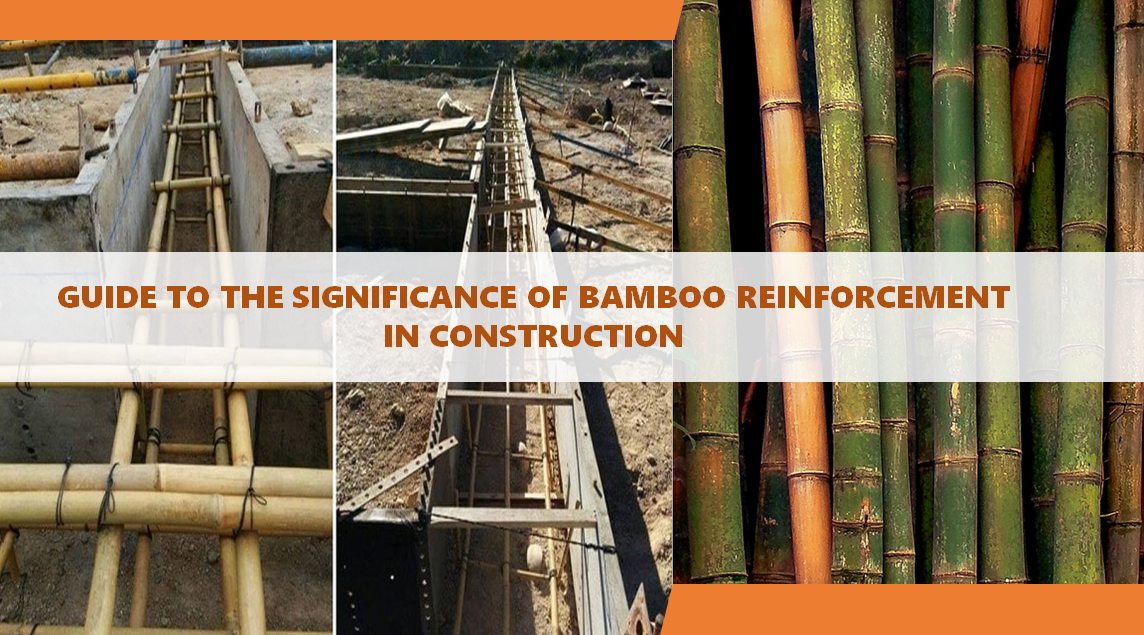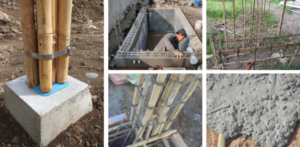
Home » Importance of Bamboo Reinforcement : A Comprehensive Guide for Civil Engineers

In the realm of construction, where strength, sustainability, and innovation intersect, bamboo has emerged as a remarkable material, offering a myriad of benefits that contribute to both the structural integrity and environmental consciousness of building projects.
This blog explores the importance of bamboo reinforcement in construction and how it’s reshaping the way we build.
Bamboo, often referred to as “green steel,” boasts impressive strength-to-weight ratios, making it a viable alternative to traditional construction materials like steel and concrete. Its tensile strength and durability make it particularly suitable for reinforcing concrete structures. Bamboo fibers, when properly treated and used, can rival the strength of steel, providing a resilient and robust framework for buildings.
One of the key reasons for the growing popularity of bamboo in construction is its eco-friendly nature. Unlike steel and concrete, bamboo is a rapidly renewable resource, growing much faster than traditional hardwoods. Its cultivation requires minimal energy and resources, and it thrives in diverse climates. Choosing bamboo as a reinforcement material aligns with sustainable construction practices, reducing the environmental footprint of building projects.

Bamboo’s lightweight nature simplifies transportation, handling, and installation processes during construction. Its flexibility allows for versatile design possibilities, enabling architects and builders to explore innovative and aesthetically pleasing structural forms. This adaptability makes bamboo an ideal material for regions prone to seismic activities, as it can flex and absorb energy during earthquakes, contributing to overall structural resilience.
In comparison to traditional construction materials, bamboo is often more cost-effective. The low production and processing costs, coupled with its abundance in many parts of the world, make bamboo an economically attractive option for construction projects. Additionally, the simplicity of working with bamboo can lead to reduced labor costs, further enhancing its appeal for builders seeking efficient and budget-friendly solutions.
Bamboo has deep cultural roots in many societies, and its use in construction can be a way to connect with local traditions. Incorporating bamboo in building projects not only pays homage to cultural heritage but also fosters community engagement. The knowledge and techniques associated with bamboo construction can be shared and passed down, promoting a sense of pride and continuity.
Governments and international organizations are increasingly recognizing the benefits of bamboo in construction. Many countries are developing standards and guidelines for the proper use of bamboo as a construction material, providing regulatory support and ensuring that bamboo-reinforced structures meet safety and quality standards.
Conclusion-
Bamboo reinforcement represents a harmonious fusion of strength, sustainability, and cultural significance in the construction industry. As builders and architects seek alternatives that align with eco-friendly practices without compromising structural integrity, bamboo emerges as a compelling solution. Its versatility, strength, and environmental benefits make it a material of choice for those envisioning a future where construction is both resilient and sustainable.
In embracing bamboo as a construction ally, we not only fortify our buildings but also contribute to a greener, more sustainable planet. The importance of bamboo reinforcement goes beyond the construction site; it is a testament to our ability to build a better future by harnessing the strength of nature.
Dr. Divyashree
Associate Professor & Head
Department of Civil Engineering
Lingayas University
B.Tech & M.Tech Civil Engineering college in Delhi
In today’s rapidly advancing world, civil engineering offers immense opportunities for career growth. For those aspiring to excel in this field, Lingaya’s Vidyapeeth emerges as the top choice. Renowned for its civil engineering colleges in Delhi NCR, its provide a comprehensive B.Tech and M.Tech courses that combines theoretical knowledge with practical skills. With state-of-the-art facilities and expert faculty, Lingaya’s Vidyapeeth equips students to thrive in the dynamic field of civil engineering.
March 5, 2024
RECENT POSTS
CATEGORIES
TAGS
Agriculture Agriculture future AI Architecture artificial intelligence Bachelor of Commerce BA English BA Psychology BTech AIML BTech CSE BTech Engineering Business management career Career-Specific Education career guide career option career scope Civil engineering commerce and management Computer Science Computer science engineering Data science degree education Engineering Engineering students English Literature english program Fashion Design Fashion design course Higher Education Journalism journalism and mass communication law Law career Machine Learning Master degree mathematics MBA MBA specialization Mechanical Engineering Pharmacy Psychology Research and Development students
University Address: Nachauli, Jasana Road, Faridabad, Haryana
For Admissions :
Toll Free: 1800-120-4613
Mobile : 8447744303 | 8447744304 | 8447744306 | 8447744309
8700003974 | 8700003411 | 8700003749
Address: C-72, Second Floor, Shivalik, Near Malviya Nagar,
Above HDFC Bank, New Delhi 110017
Landline No. - 011-46570515 / 45138169 / 41755703
Mobile No. - +91-7303152412 / +91-7303152420 / +91-9311321952
Jagmani Kutir, Ground Floor, Road No-1, Rajeev Nagar,
Near Darbar Marriage Hall, Patna-800024, Bihar
Contact No: 9818352069/ 8130120095
Mail: kanhaiya@lingayasvidyapeeth.edu.in
Copyrights © 1998 - 2025 Lingaya's Vidyapeeth (Deemed To Be University). All rights reserved.
It is important to note that the following email IDs and domains are fraudulent and do not belong to our university.
LV only conducts physical/online verification of any document related to examination on the following email id: